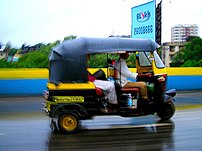(This is a live-blog of the TiE Pune talk by Mohit Dubey, Founder and CEO of CarWale.com. This is essentially an unorganized collection of interesting/insightful statements made by Mohit during his talk.)
- “Carwale.com, the story so far: Started in 2005, seed funding in 2006, hit break-even point in 2007, series A funding in 2008, got acquired in 2010. So far, the website has served 3,12,68,180 people.”
- “Nobody gave me a job. So I had to start my own company”
- “I was never really good at coding. But I was good at jugaad, and co-ordination. I did an ecommerce course, but at the end I wasn’t good enough to create an ecommerce website. I convinced my teacher that she should do the website, and she would get a certificate of having worked on an industry project, which will help you in your career.”
- “I am not a genius. I took a two-year drop but did not get into IIT. None of my colleagues in CarWale.com are geniuses. We’re all ordinary people. Who stayed together for a long time. Ordinary people + Years of effort together = Success.”
- “If you have a purpose, it’s easier to find soulmates.”
- “For two years, we kept trying to do tele-medicine. But that never really took off. In the meantime, we kept doing software work for anybody we could. Everything we did failed. Co-founders never complained, because we had a relationship.”
- “Commitment is more important than competence. Sticking together is more important.”
- “‘We’ll pay you whatever we can pay, whenever you can pay’ was the salary offered to Gaurav.”
- “In 2005, I went to Bombay to figure out what to do. I told my team to give me 2 months to figure something out. Otherwise we’ll close down the company. I got a Rs. 10000 contract to build a website for a used car dealership. I spent 3 months understanding the business. My team wondered why I was spending 3 months for a Rs. 10000 contract. But the software that we built for the used-car dealership, we started selling to other used-car dealerships. At this point, I was given the advice that I was trying too many things, and wanted to do everything. I should focus. So I decided that I would focus only on automobiles. And thus CarWale.com was born. My team (8 people) disagreed with me, but I decided that they were wrong.”
- “I sold the software to 30 dealerships. And after a while realized that none of them were using the software to sell cars. We decided that something was wrong. And changed the model within 10 days. We decided to take it to the customers directly ourselves.”
- “Done is better than perfect. If you launch a product and it is bug-free, you waited too long to release it.”
- “The purpose is fundamental. The purpose helps you get the right time. Cash? Go to spouse, parents, relatives, friends. If you can’t get money from them, how will you get it from strangers? Also HNIs and Angels. Everybody who was rich in Bhopal, I approached them for money. You need to be able to do that.”
- “For funding purposes, we made a 60-page business plan. But with the strategy changing every 2 weeks, it was difficult to keep the 60 pager updated. So we went down to 5 pages, and even that was a problem. So we brought it down to 2 pages. What worked? 5 line email which resulted in a reference; and the reference really did it.”
- “Everything takes longer. 2x or 3x. So stay optimistic about building a valuable company, not about the launch, or hiring, or a big client, or funding, or anything specific.”
- “Things can change quickly. When that happens, we don’t wait for a weekly meeting, or a monthly meeting, or a big company meeting to decide. We have a quick huddle, and take a decision”
- “These are the four core values of our company: 1. Treat Others Well. 2. Be Responsible. 3. Be Agile. 4. Company Before Self. These should be qualities you already have before we hire you. These are more important than ‘standard’ things like customer satisfaction.”
- “By 2020, one of the world’s top 3 online auto companies is going to be from India.”
- “We had no cash in the bank. I remember going to a dealership one day with no money, and I was thinking that I must make a sale today, and ask them to pay some money in cash upfront. That sort of a situation really helps focus your efforts.”
- “To share equity in the company, I had a very simple method. Early in the company, you have no clue which co-founder is going to be most important. And the guy with the idea does not deserve more equity – the idea is not important, at all. The best answer is distribute equity equally. You’ll get better commitment that way. For early employees, the people who join the company within the first 6 months, I allocate 7.5%. A total of about 20% to be allocated to all your employees.”
- “Today if someone wants to create an online store, there is no need to do a website. Just create a facebook page.”
- “When writing content, focus on the user. Do SEO and SEM, but write content for the user, not for Google.”
- “There are very, very few tech companies that need to operate in stealth mode. Everybody else should stop being secretive and talk about their idea in full detail with VCs etc. Your execution, your company culture, your method of hiring, cannot be copied. Startups have a DNA which allows them to move very fast and take decisions quickly. Big companies cannot do that.”



![Reblog this post [with Zemanta]](http://img.zemanta.com/reblog_b.png?x-id=4608fc72-dcb8-4511-9b86-967d13574a92)